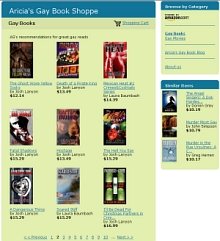A gay novel with history, music, blood and revenge: Ann Rice's CRY TO HEAVEN
 When anybody quotes you Ann Rice's sorta-kinds gay fiction, they always talk about the vampire books -- and that's fair enough because those are great books too, and I'll talk about them in due course! But the one everyone overlooks, or forgets, or never even knows, is this one. Cry to Heaven.
When anybody quotes you Ann Rice's sorta-kinds gay fiction, they always talk about the vampire books -- and that's fair enough because those are great books too, and I'll talk about them in due course! But the one everyone overlooks, or forgets, or never even knows, is this one. Cry to Heaven.
Okay: some folks are asking already ... "Yes, but it is a gay book?" Well, yes it is, and no it isn't. But then again, the same could be said for the vampire novels. Are they gay books or vampire books? There's loads of hetero romance in there as well. So, where do you shelve Cry...? With your gay books, or with your historicals?
The story is set in Venice and other parts of Europe, way back in the 1700s, when music was maturing, and at the exact same time the authorities still embraced the, uh, well, the mutilation of children. In other words, castrating pre-teen boys for the cathedral choirs. Until Ann Rice did the research, most or even all people assumed that when the male gets castrated he's never going to feel anything sensual ever again. Not only does this turn out to be wrong, it turns out to be extremely wrong! The castrati, or eunuchs, were philandering and promiscuous -- and it gets "better." Because they'd been deprived of their gonads, the Vatican no longer recognized them as men.
Yeah. This mean homosexual relationships were "on," and Very Senior Priests could get romantically entangled with castrati without committing much of a sin. Okay. The stage is set.
Entering at Stage Right is Tonio Treschi: 15 y.o., too beautiful for his own good and annoying all the wrong people. They could have assassinated him, but they didn't. You guessed: they have him abducted and castrated. He'd had a glorious singing voice before being kidnapped, and at 15 his voice hadn't broken yet (which is probably stretching a point ... but Ann Rice didn't have a choice about stretching it. Tonio was having romantic liaisons -- which was the whole reason someone somewhere was furious enough with him to have him abducted and castrated in revenge. And if AR had made Tonio any younger than 15, modern day audiences would have had a big, big problem with the book ... we have terrible problems these days figuring out where the p*orno stuff starts when young people are concerned. There's a lot of books that are walking on a tightrope, and you could say Cry... is one of them because of Tonio being only 15 y.o. To read more on this difficult topic, I'll link you through to the new intro to MK's White Rose of Night. MK had the exact same problem with the character of Paul, in a (fantastic) 12th century novel about knights and squires and Saracens. Here's the link, go get it: http://www.dream-craft.com/tenthdimension/intro4wr.htm).
Anyway -- get past this. Understand that it's a historical. Times were different. People grew up faster. Girls were married at 11 etc. etc., and in about 1750 nobody gaver a fying f*** if a 15 y.o. was getting randy. They probably all did.
And here's the big debate: is Cry to Heaven a gay book -- or not? Because it centers on a boy who's been emasculated. In 1750, the Vatican sure didn't see the emasculated male as a man. Do we today? I think of Cry... as a gay book because there are loads of relationships and incidents between castrati and "full" males, as well as a hetero romance, which Rice seemed to throw in there to make the story resolve properly (ie., happily). Also, the hetero romance (Tonio and a young woman who's an artist) might have been added to make the book more swallowable -- or even plausible! -- to the mainstream publishing industry in 1982. It was published by Alfred A Knopf Inc., which made it as much a milestone as The Boy Who Picked The Bullets Up.
I definitely call it a gay book, because there's a whole lot more gay encounters than there are in other books that are categorically gay ... and Rice's writing is a lot more frank about them (meaning, explicit) than the writing you find in other gay books.
And as per gay books, it's got to be in the Top 50 because it has so much: fantastic research, great writing, 532pp of all this -- a complicated plot that keeps you reading, characters that come to life. (A large slice of gay literature is actually not very well written. Other books are anorexic in terms of plot. Or else they're so well written and plotted, they forget to be gay -- you go for 50pp without stumbling over an element you could call "gay enough" to call the overall book a "gay book." I'm sure you know what I mean here.)
Cry to Heaven is about personal survival and, eventually, revenge. It's also about music, singing, European history, and human nature. I must have read it four or five times since I was loaned a copy back in the '80s, and it's always the "darkness" of the theme that pulls me in, and the richness of Rice's writing than keeps me there. This book is better written than the vampire novels, esp. the later vampire novels where ... is it me, or does the writing get rather slipshod? And much more readable than The Feast of All Souls, which came out in 1979.
Copies are absolutely, positively available from alibris and Amazon.
Highly recommended. AG's rating: 5 out of 5 stars.
Here's Ann Rice at Wiki: http://en.wikipedia.org/wiki/Anne_Rice









0 comments:
Post a Comment